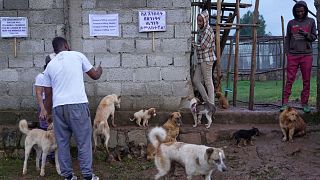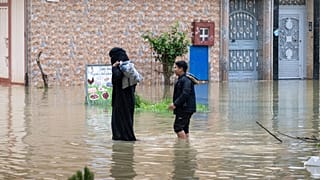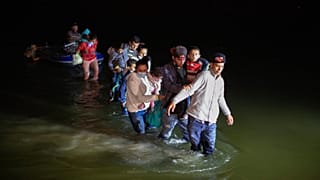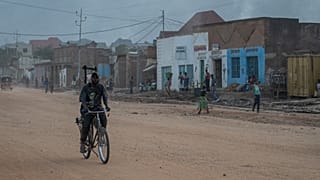Morocco
Morocco is scaling up a nationwide program to sterilize, vaccinate, and release stray dogs, as part of efforts to manage their population while addressing concerns about public health and animal welfare.
A mutt with a blue tag clipped to her ear whimpers as she’s lifted from a cage and carried to a surgery table for a spay and a rabies vaccine, two critical steps before she’s released back onto the streets of Morocco’s capital.
The "Beldi," as Moroccan street dogs are called, is among the hundreds taken from Rabat to a dog pound in a nearby forest.
As part of an expanded "Trap, Neuter, Vaccinate and Return" program, dogs like her are examined, treated and ultimately released with tags that make clear they pose no danger.
It’s a program that Morocco is eager to showcase after animal rights groups accused it of ramping up efforts to cull street dogs after being named co-host of the 2030 FIFA World Cup last year.
"Today, this is the only solution to manage this issue, reduce nuisances and prevent diseases transmitted by these animals," said Mohamed Roudani, the director of the Public Health and Green Spaces Department in Morocco’s Interior Ministry.
Morocco adopted “Trap, Neuter, Vaccinate and Return,” or TVNR, in 2019.One facility has opened in Rabat and more are set to be launched in at least 14 other cities, aligning Morocco with recommendations from the World Organization for Animal Health.
The government has spent roughly $23 million over the past five years on animal control centers and programs.
Roudani said Morocco’s updated approach balanced public safety, health and animal well-being.
Local officials, he added, were eager to expand TVNR centers throughout the country.
Though population estimates are challenging, based on samples of marked and tagged stray dogs, Moroccan officials believe they number between 1.2 to 1.5 million.
Some neighborhoods welcome and care for them collectively.However, others decry their presence as a scourge and note that more than 100,000 Moroccans have needed rabies vaccinations after attacks.
"The most important issue behind this work is the transmission of rabies. In Morocco, the dog is unfortunately a vector of rabies," said said veterinarian Fatima Zahra Bouasria.
A draft law is in the works that would require owners to vaccinate pets and impose penalties for animal abuse.
On a visit organized for journalists to a TNVR center in El Aarjate, enclosures for dogs appear spacious and orderly, with clean floors and the scent of disinfectant.
Food and water bowls are refreshed regularly by staff who move between spaces, offering gentle words and careful handling.
Some staff members say they grow so attached to the dogs that they miss them when they’re released to make space for incoming strays.
Veterinarians and doctors working for the Association for the Protection of Animals and Nature care for between 400 and 500 stray dogs from Rabat and surrounding cities.
Dogs that veterinarians deem unhealthy or aggressive are euthanized using sodium pentobarbital, while the rest are released, unable to spread disease or reproduce.
Animal rights groups routinely use large sporting events to draw attention to their cause and similarly targeted Russia in the lead-up to the 2018 FIFA World Cup there.
Citing unnamed sources and videos it said were shot in Morocco, the International Animal Welfare and Protection Coalition claimed in January that Morocco was exterminating 3 million dogs, particularly around cities where stadiums are being built.











01:28
Senegal's Prime minister denounces Morocco's jail term for football fans
00:51
Morocco and PSG football star Achraf Hakimi to face trial for rape
01:03
US hosts new Western Sahara talks amid deep divergences
01:09
Donald Trump's 'Board of Peace' pledges $7 billion to rebuild Gaza
Go to video
Moroccan lawyers end strike after government backs down on reform bill
01:40
South Africa starts extensive vaccine campagin against FMD in cattle